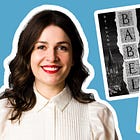Astrid Has Strong Opinions About the New Novels from Jesmyn Ward and Melissa Broder
'Let Us Descend' and 'Death Valley' do grief and growth very differently
News & Reviews Magazine
This article is part of our December edition. Read the editor’s letter to see what other fantastic writing has just been published. If you’re annoyed that it’s paywalled, then that means you wanted to read it, which means you value it. These writers get paid for what they do because their work is valuable. If you like that this type of independent media exists, please back it!
The piece you’re reading now is by Astrid Edwards. Astrid is the host of The Garret: Writers on Writing and has interviewed more than 200 of Australia’s most prominent writers and publishers. She is a teacher in the Associate Degree of Professional Writing and Editing at RMIT University and sometimes judges literary prizes, including the 2023 Stella Prize. In 2023 she began a PhD at the University of Melbourne exploring potential and perceived barriers to publishing and selling climate fiction in Australia. In 2021 Astrid contributed to the anthology Growing Up Disabled in Australia and made her debut appearance on Q+A in 2021.
Astrid writes for News & Reviews Magazine every month. These are her last pieces, from the August, September, October, and November editions:
Grief is one of the hardest experiences for a writer to capture. It exposes both characters and the writer themself to judgement from readers. After all, we all come to the page with our own intimate experiences of loss.
Astrid’s hot take
In Let Us Descend Jemsyn Ward delivers a masterclass on grief, bringing the agony and the torment and the misery of it all to life. This is a novel that operates on many levels. The stakes are high for the individual—every chapter brings the risk of maiming or death, and more painfully forced family separation. But the broader stakes are also tied to the historical significance of the setting. Through the experiences of one phenomenal character the reader feels something of the experience of the millions of people enslaved in the United States. This is a novel that sets out to do what only great fiction can—to allow people to feel beyond their own experience. It matters.
Melissa Broder does the opposite in Death Valley. The novel is a bloated, repetitive, and mediocre. The unnamed female protagonist hides out in a Best Western to avoid both her chronically ill husband and her father who is in an ICU. She is supposed to be using the time to write a book, which theoretically allows Broder to muse on the value of literature, but the set-up doesn’t work. The deeply uninteresting protagonist does nothing but get herself lost in the Californian Desert. It’s lazy plotting, deus ex machina stuff. She hallucinates a giant saguaro (pronounced ‘suh-waa-ro’) and wants to find it again. Honestly, the saguaro is the highlight of the book. I mean, saguaros are hot shit. Death Valley, however, is not. It is a one-trick coyote that would have worked better cut by 150 pages and published as a novella.
Keep reading with a 7-day free trial
Subscribe to News & Reviews by Bri Lee to keep reading this post and get 7 days of free access to the full post archives.










